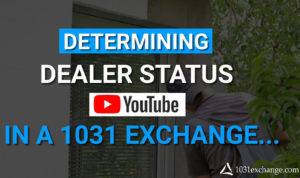Real estate investing is all about timing and strategy. David and Tom Moore, the 1031 Exchange Bros, are experts in clarifying how to deal with the multifaceted issues that arise with investment properties and taxes. Their newest conversations are centered on the avoidance of the IRS dealer status through appropriate holding periods and the benefits 1031 Exchange brings. This blog post will summarize the main ideas tackled in their video, thus making it a detailed roadmap for investors who want to adhere to IRS rules while maximizing their gains.
Understanding the 1031 Exchange
Investors have the advantage of using the 1031 Exchange, which was derived from Section 1031 of the Internal Revenue Code. This option enables them to shift capital gains taxes incurred due to the sale of an investment property to the new property instead if they use the amount they received for the sale. This method of acquiring and holding real estate is primarily advantageous for individuals who want to increase their financial assets while not maintaining immediate tax obligations. Nevertheless, the IRS imposes strict laws to discern regular investments from properties held for resale, otherwise, one could be classified as a “dealer”.
Avoiding IRS Dealer Status
Investors are notably wary of the IRS dealer classification that they might get. This is usually the case for people who regularly purchase and sell properties, treating them essentially as stock rather than assets. The consequences of such designations can be heavy, as they impose different types of tax and other requirements on the person concerned.
David and Tom underscore that the IRS does not dictate any mandatory holding period for investment properties, but the investor’s intention is the most essential factor. To illustrate, when a person acquires a property with the plan to rent it out but subsequently sells it off because of an attractive offer from a neighbor, this can create possible issues that might arise if not properly managed.
When to Sell: The Neighbor Knock
Picture this situation: you score a property for an awesome price, fully planning to keep it as a rental property. A month later, your neighbor comes to you with an unbelievable offer that is hard to refuse. In that situation, renting may look like a suitable decision, especially if the property has already reached its full potential. But the timing of the sale really matters as it decides whether the IRS will see the deal as a real investment or as a quick flip.
David and Tom point out that even though there is not a required timeframe for not selling the property, the IRS will check your motives for selling it very carefully. If you have some proofs that you were planning to keep the property for the sake of an investment, like rental contracts or the information about the work done on the property, you can show that you were right and should not be considered a dealer.
Flexibility in Investment Strategies
Flexibility is one of the key factors attracting investors to 1031 Exchange. Beyond the scope of just swapping houses—a single-family home for a duplex, land for commercial property or anything in between to a more complex exchange—investors have the possibility to reconfigure their tactics according to the market scenario and individual objectives.
According to David and Tom, investors have to carry a flexible mindset towards their investment strategies if they want to do well in the real estate market. For example, if a high return opportunity pops up which demands the property to be sold prior to the expected date, the 1031 Exchange offers a way to re-invest the proceeds without incurring immediate taxes. This flexibility can prove to be a turning point for a clever investor.
Important Considerations for Investors
Though the 1031 Exchange is replete with benefits, there are several considerations which need to be kept in mind by each and every investor:
- Intent Matters: Always document your intentions when acquiring and holding properties. This could include rental agreements, maintenance records, and financial statements.
- Consult Professionals: Engaging with tax advisors and real estate professionals can help you navigate the complexities of the 1031 Exchange and avoid pitfalls.
- Market Conditions: Be aware of current market conditions and how they may affect your investment strategy. Flexibility can lead to better outcomes.
- Time Constraints: Remember that you have a limited time frame to identify and close on replacement properties under the 1031 Exchange rules—45 days to identify and 180 days to close.
Playing the Long Game
The experience of David and Tom Moore absolutely emphasizes that the implementation of a structured plan is far more beneficial than acting quickly in real estate investing. The benefit of utilizing a 1031 Exchange is to enjoy deferrals on the tax part and invest in a profitable venture, however, the use of it needs to be done through proper planning and careful execution. The dealers who understand the IRS dealer status intricacies and the chance of the 1031 Exchange can be most successful in the tax relief gain and the investment profit.
As you consider your next real estate investment, keep these strategies in mind. Whether you’re a seasoned investor or just starting, the principles of the 1031 Exchange can significantly enhance your wealth-building journey.
To stay up to date with our video content subscribe to our YouTube channel.
Whether looking for information on simple to complex 1031 issues, Cost Segregation, Life Insurance Contract Sales, DSTs or even Qualified Opportunity Zones you will find information on our channel.
The Guys With All The Answers…
 David and Thomas Moore, the co-founders of Equity Advantage & IRA Advantage
David and Thomas Moore, the co-founders of Equity Advantage & IRA Advantage
Whether working through a 1031 Exchange with Equity Advantage, acquiring real estate with an IRA through IRA Advantage or listing investment property through our Post 1031 property listing site, we are here to help Investors get where they want to be. Call them today! 503-635-1031.









